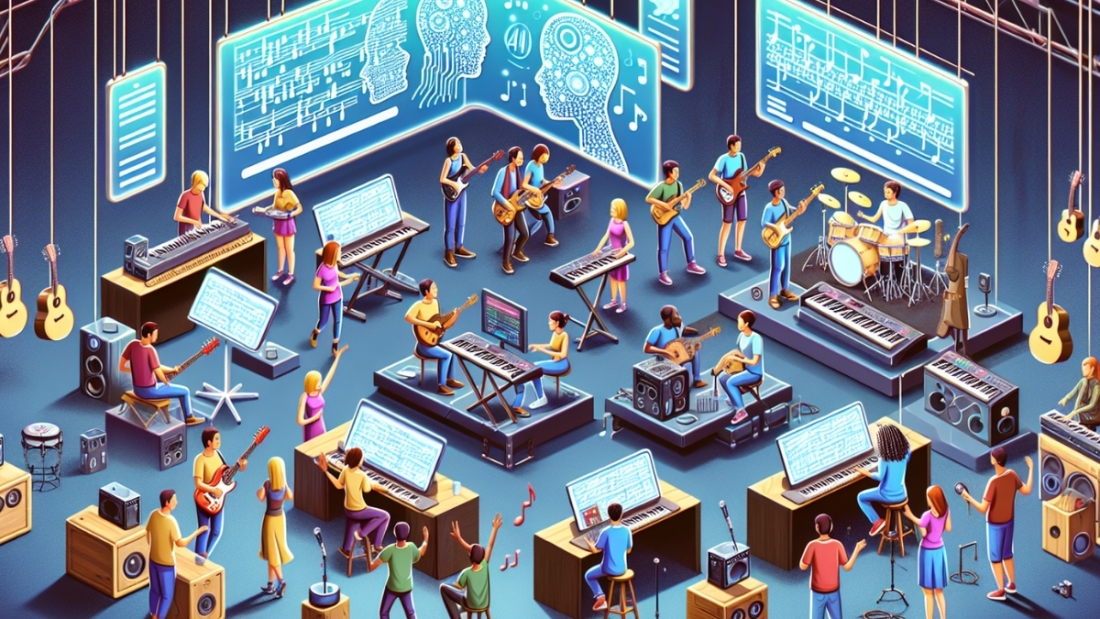In the evolving landscape of the modern music industry, the integration of AI marks an accelerating shift. From personalized musical experiences, AI music generator tools, to AI vocals; it’s just the beginning. By leveraging AI and music together, musicians, producers, and enthusiasts are now able to explore new horizons in terms of creative process. Despite its early criticism, AI in music is here to stay and it is accelerating.
Understanding AI Algorithms in Music
Artificial intelligence is significantly transforming music composition by employing sophisticated algorithms and machine learning to analyze extensive datasets of music. This analysis helps AI identify patterns and styles, which are then used to create original compositions that challenge genre conventions. Machine learning, a subset of AI, plays a crucial role by training systems to recognize musical patterns. It then takes these music patterns in order to generate new unique compositions. Moreover, neural networks mimic human brain functionality to process musical inputs and, enhancing their capabilities with each training cycle.
Examples of Popular AI-Generated Music
AI’s transformative influence in music creation has led to impressive examples across various genres. From classical symphonies reminiscent of Mozart to modern electronic dance tracks, this technology has been featured in albums, film soundtracks, and advertising campaigns, showcasing the versatility and potential of AI in music creation.
Notable examples include Taryn Southern’s album I AM AI, entirely composed and produced by AI, and the completion of Beethoven’s unfinished Symphony No. 8. As exciting as it has been it also comes with controversy. Let us remember the controversy AI music has started in terms of copyright infringement and ownership.
AI as a Collaborative Tool for Musicians
AI-driven tools are revolutionizing the way musicians collaborate and enhance their creative workflows. These tools offer intelligent suggestions for chord progressions, melodies, and arrangements, helping artists overcome creative blocks. For instance, AI algorithms can analyze live performances and enhance them in real-time, providing vocalists with pitch correction and harmonization tools for a polished sound. To put in lamest terms, it can be considered the Autotune Renaissance. Taking the original Autotune and putting it on steroids.
Tools Used to Spark Creativity
AI-generated music composition tools like MuseNet can spark creativity by providing new melodies, chord progressions, and rhythms, serving as foundational elements for songwriting. These tools allow artists to experiment with new musical styles, potentially transforming their creative workflow.
Moreover, AI-powered software like LANDR can automatically master tracks, ensuring industry-standard quality. This is a big deal as it saves artists time and allows them to focus more on their creative vision. By integrating AI-generated content, artists can blend traditional techniques with AI tools, maintaining their unique artistic touch and boost their workflows.
Tailoring Music to Mood and Preferences
AI-driven tools now enable a profound connection between music and listeners by personalizing experiences through mood and preferences. Platforms like Moodify utilize AI to analyze current music and suggest new tracks that match the emotional tone, enhancing user engagement and satisfaction. Furthermore, AI algorithms can dynamically adjust music based on real-time emotional and physiological data, offering their own personalized experience.
AI in Music Streaming Services
Music streaming services have revolutionized personalized music experiences by employing AI to analyze vast amounts of user data. Services like Spotify and Apple Music use collaborative filtering and deep learning models to create playlists that reflect users’ tastes and moods. This goes back to the streaming companies using us personalized data as the input to their systems. These platforms continuously adapt their recommendations based on user interactions, ensuring a fresh and tailored listening experience every time.
The Future
Exploring the vast and transformative role of AI in the music industry, we find ourselves at the cusp of a creative revolution. The synthesizing powers of AI, from generating entire compositions to enhancing music production, ushers in an era where technology elevates artistic expression. Whether it’s breathing life into unfinished symphonies or crafting never-before-heard harmonies, AI’s contribution is shaping an inspiring landscape for creators to experiment and innovate.
By understanding and utilizing AI, aspiring artists are now equipped more than ever to create. As those people get their hands on these tools, they may go far enough down the rabbit hole to find something that helps them create amazing music we have never heard before.



Leave A Comment